The soft buzz of a mosquito near your ear on a warm summer evening can instantly shatter the peace of your outdoor sanctuary. As a professional landscaper, I’ve seen countless gardens and outdoor spaces plagued by pesky insects. But what if I told you that nature itself offers a solution to this age-old problem?
Welcome to the world of natural pest control using plants that repel insects. This eco-friendly approach not only keeps bugs at bay but also enhances the beauty and biodiversity of your garden. From aromatic herbs to vibrant flowers, these plants serve as natural guardians against unwanted pests.
Imagine sipping your morning coffee surrounded by fragrant lavender, knowing it’s working overtime to keep mosquitoes away. Or picture a thriving vegetable garden protected by companion plants that deter harmful insects. These aren’t just dreams – they’re achievable realities with the right plant choices.
Let’s explore how you can harness the power of nature to create a pest-free oasis in your backyard. We’ll dive into the best plants that help repel mosquitoes, bugs, and other insects, transforming your outdoor space into a haven for both you and beneficial wildlife.
From the calming scent of lavender to the pungent aroma of garlic, nature has equipped many plants with powerful pest-deterring properties. For instance, lavender essential oils have shown an impressive 80.9% repellency effect against certain mosquito species. Similarly, citronella, found in lemongrass, has demonstrated a 100% repellency effect against malaria-carrying mosquitoes.
But the pest-repelling power of plants doesn’t stop there. Basil, a common herb in many kitchens, contains four volatile compounds that could deter mosquitoes. Thyme, when crushed, has shown a 62% repellency effect compared to DEET against mosquitoes. Even more surprising, the compound nepetalactone in catnip has been found to be even more effective than DEET at repelling mosquitoes in lab trials.
As we delve deeper into this topic, you’ll discover how to create a natural barrier against pests using a variety of plants. From herbs like rosemary that repel Japanese beetles and carrot flies to flowers like chrysanthemums that ward off ants, ticks, and even bedbugs, there’s a plant for every pest problem. By the end of this article, you’ll be equipped with the knowledge to design a beautiful, fragrant, and pest-resistant garden that thrives in harmony with nature.
Key Takeaways
- Plants offer a natural and eco-friendly solution to pest control
- Lavender and citronella are highly effective against mosquitoes
- Herbs like basil and thyme have potent insect-repelling properties
- Chrysanthemums repel a wide variety of pests
- Companion planting can enhance your garden’s pest resistance
- Natural pest control supports biodiversity and environmental health
Introduction to Natural Pest Control with Plants
Gardening lovers are now choosing sustainable ways to keep their gardens healthy. Using plants to fight pests is a safe and green way to protect your garden. Let’s see how plants can change your gardening for the better.
The Importance of Sustainable Pest Management
Keeping a garden healthy means managing pests in a way that’s good for the environment. Plants that keep insects away mean less need for harmful chemicals. This helps all kinds of insects, including those that help pollinate and control pests naturally.
Benefits of Using Plants for Pest Control
Adding plants that keep pests away has many perks. These plants not only protect your garden but also make it look beautiful. For example, marigolds keep mosquitoes and rabbits away with their strong smell. Chrysanthemums have pyrethrins that keep roaches, ants, ticks, and fleas away.
How Plants Deter Insects Naturally
Plants have special ways to keep insects away. Some, like citronella grass, give off smells that mosquitoes don’t like. Others, like mint and thyme, keep away aphids, cabbage moths, and whiteflies. Garlic also keeps slugs and snails away. By placing these plants in your garden, you create a natural barrier against pests.
| Plant | Pests Repelled |
|---|---|
| Lavender | Moths, fleas, flies, mosquitos |
| Basil | Mosquitoes, flies |
| Petunias | Aphids, tomato worms, squash bugs |
Choosing these natural ways to fight pests helps your garden and the planet. Start using these plant-based repellents and see your garden thrive naturally.
Understanding Plant-Based Pest Repellents
Plant-based repellents are a natural way to keep insects away. Many plants have essential oils and compounds that keep pests away. These substances confuse or repel pests with their strong smells.
Citronella in lemongrass and citronella grass is a known mosquito repellent. It keeps mosquitoes and other bugs away when applied on the skin. Other plants like lemon thyme, lavender, garlic, rosemary, basil, and catnip also keep insects away.
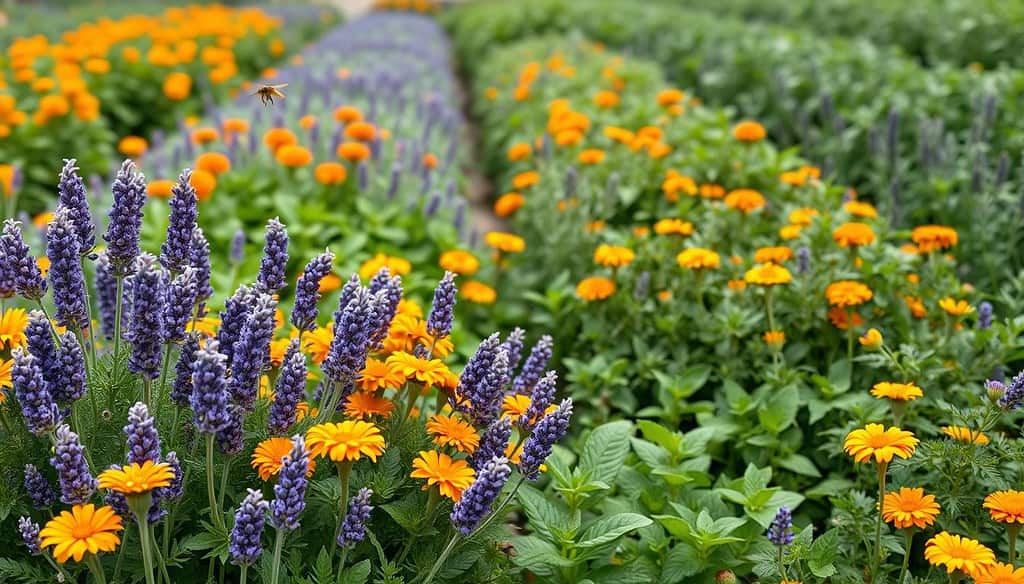
Research shows that plant-based repellents work well. Lemongrass kept 74% of certain mosquitoes away for 2.5 hours. Lemon thyme was as effective as DEET, keeping 62% of mosquitoes away. Catnip essential oil repelled 96% of stable flies and 79% of houseflies.
Eucalyptus leaves also protect against mosquitoes. A study in Guinea Bissau found they offered 72.2% protection for two hours. Lavender, with its linalool, effectively repelled up to 93% of mosquitoes with indoor diffusers.
Plant-based repellents can be effective but their strength varies. Often, more of the plant’s scent is needed for best results. Some plant oils can irritate skin, so test them on a small area first. For effective bug control, using plant-based repellents with other methods like removing standing water works best.
What Are the Best Plants That Repel Insects?
Nature has many plants that can keep insects away. By adding these plants to your garden, you can enjoy a bug-free outdoor space. You won’t need to use harsh chemicals to keep pests away.
Herbs that repel insects
Many herbs are great at keeping insects away. Basil is a top choice for fighting pests. It keeps flies, mosquitoes, and other bugs away.
Mint is another great herb for bug control. It keeps spiders, ants, and mosquitoes away.
Rosemary and lavender are also good at keeping insects away. Rosemary keeps cabbage worms and mosquitoes off. Lavender keeps gnats and moths away, making it perfect for near your home.
Flowers with insect-repelling properties
Pest-repelling flowers make your garden look beautiful and keep pests away. Marigolds are great at keeping plant lice and mosquitoes off. Chrysanthemums are very effective against many insects, including ants and ticks.
Petunias add color and keep insects away. They repel beetles and aphids. Geraniums have citronella oil, which helps keep mosquitoes away.
Vegetable plants that deter pests
Some vegetables can help control pests in your garden. Garlic is great at keeping beetles and flies away. It also keeps mosquitoes off.
Chives protect against beetles and flies, making them good for vegetable gardens. Planting these vegetables together can make your garden healthier and more productive.
| Plant | Insects Repelled | Additional Benefits |
|---|---|---|
| Basil | Flies, mosquitoes, carrot flies | Culinary herb |
| Marigolds | Plant lice, mosquitoes | Colorful flowers |
| Garlic | Japanese beetles, root maggots | Edible bulbs |
| Lavender | Gnats, mosquitoes, moths | Fragrant flowers |
Creating an Insect-Repelling Garden Design
Creating a garden that keeps insects away needs careful planning and design. Use companion planting and pest control methods to make a space that looks great and keeps bugs away.
Companion Planting Strategies
Companion planting is a powerful way to control pests naturally. By pairing certain plants, you can keep away specific insects and help plants grow well. For instance, marigolds near vegetables can protect them from pests. These flowers bloom from late spring to frost, offering protection for a long time.
Here are some good plant pairings:
- Tomatoes with basil to repel flies and mosquitoes
- Carrots with sage to ward off carrot flies
- Cabbage with nasturtiums to divert caterpillars
Optimal Placement of Pest-Repelling Plants
Putting insect-repelling plants in the right spots makes your garden better at fighting pests. Plant lavender, which does well in zones 5-11 and blooms from summer to fall, near doors to keep flying bugs away. Put citronella grass, best for zones 9-11, around outdoor seating to keep mosquitoes away.
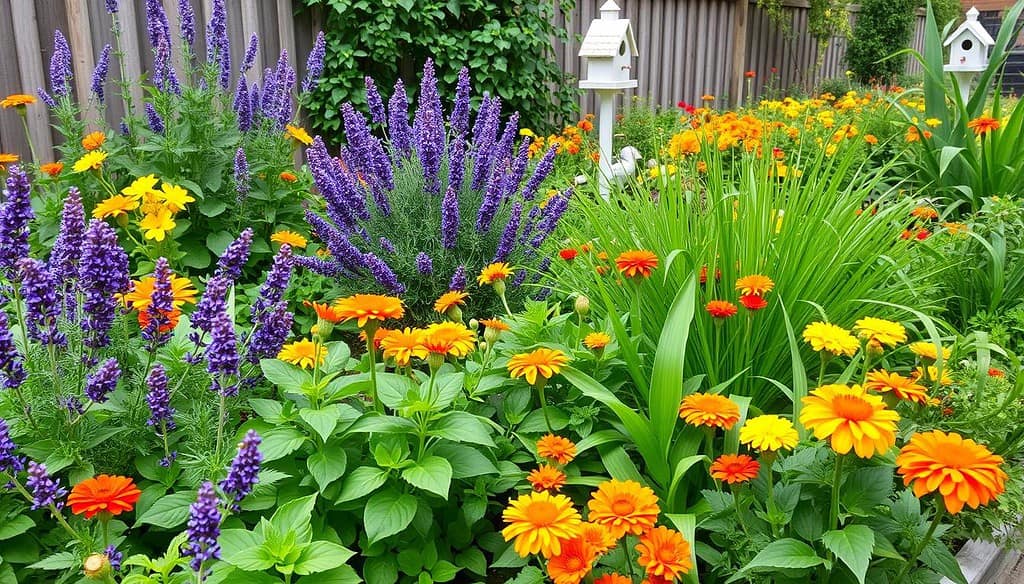
Incorporating Pest-Repelling Plants in Container Gardens
Container gardens let you easily control pests. Use pots for mint, which likes zones 3-8, near patios or windows to keep flies and mosquitoes away. Basil, in zones 10-11, can be grown in containers and placed around your outdoor areas.
Here’s a quick guide to some popular pest-repelling plants for containers:
| Plant | Growing Zone | Sun Requirement | Pests Repelled |
|---|---|---|---|
| Petunias | 9-11 | 5-6 hours daily | Aphids, tomato hornworms |
| Chrysanthemums | 5-9 | Full sun | Roaches, ants, ticks |
| Catnip | 3-9 | Full sun | Mosquitoes, flies |
By using these design tips, you’ll make a garden that naturally keeps insects away and supports good bugs. A garden with many plants not only keeps pests away but also helps nature and attracts wildlife.
Targeting Specific Pests with Plant Choices
Choosing the right plants is key to fighting pests naturally. By picking plants that repel insects, you can protect your garden. Studies show that planting certain plants together can reduce pests on vegetables.
Some herbs are great at keeping pests away. Basil near tomatoes can cut down on tomato hornworms. Catnip keeps away flea beetles and other pests. Chives help protect vegetables from aphids and cabbage moths.
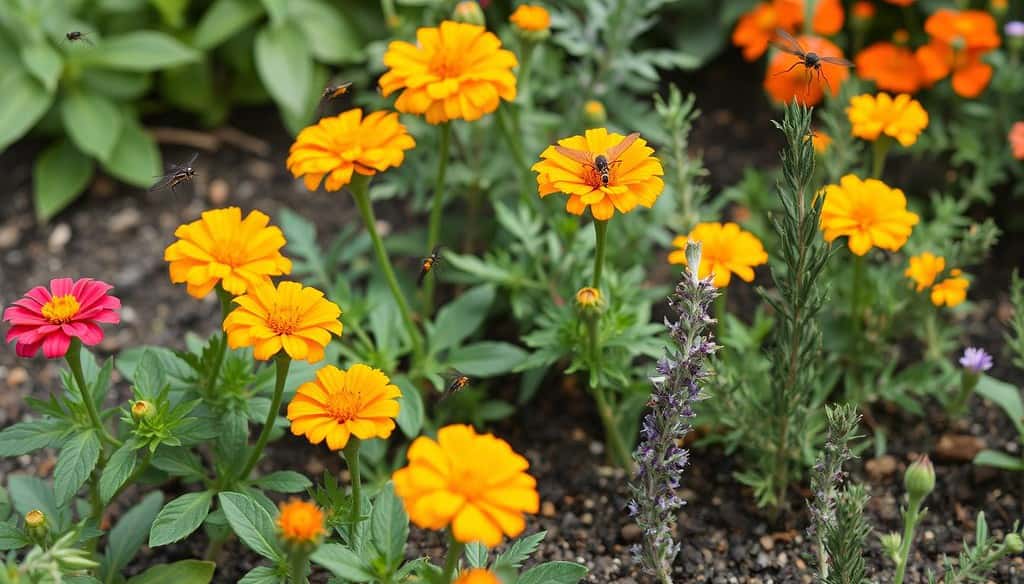
Rosemary is good against carrot flies and snails. Chamomile helps protect brassicas from pests. Marigolds keep tomatoes safe from root-knot nematodes. Wormwood and tansy reduce damage from certain beetles and butterflies.
Lavender keeps moths and beetles away from your kitchen. Chrysanthemums fight off roaches and other pests. Marigolds also deter gnats and midges. Basil, mint, sage, and rosemary help keep flies out of your home.
For fun pest control, try carnivorous plants like Venus flytraps. These plants eat insects, making them great for controlling flies at home.
Placing these plants wisely makes them work better. Put herbs around vegetables for the best protection. With these plants, you can naturally control pests in your garden and home.
Maintaining Your Pest-Repelling Garden
A pest-repelling garden needs the right care to stay healthy. Let’s look at the best ways to keep your garden in top shape. This ensures your natural pest control works well all year.
Proper Care for Insect-Repelling Plants
Each pest-repelling plant has its own needs. Citronella plants do well in Zones 9-11 and need six hours of sunlight a day. Lavender, good for Zones 5-9, likes full sun and soil that drains well. Rosemary, best for Zones 7-10, needs warm, well-drained spots with lots of sunlight.
Basil keeps away tomato hornworms, thrips, aphids, flies, ants, and mosquitoes. It grows best in full sun with moist, well-drained soil in Zone 10. Marigolds, which keep whitefly and aphids away, can grow in Zones 2-11. They prefer full sun to partial shade.
Seasonal Considerations for Pest Control
Seasonal gardening is key to controlling pests organically. In spring and summer, plant citrus grass to keep mosquitoes, wasps, houseflies, and fruit flies away. In cooler times, use perennials like thyme. It keeps mosquitoes, cabbage loopers, white flies, and tomato hornworms away.
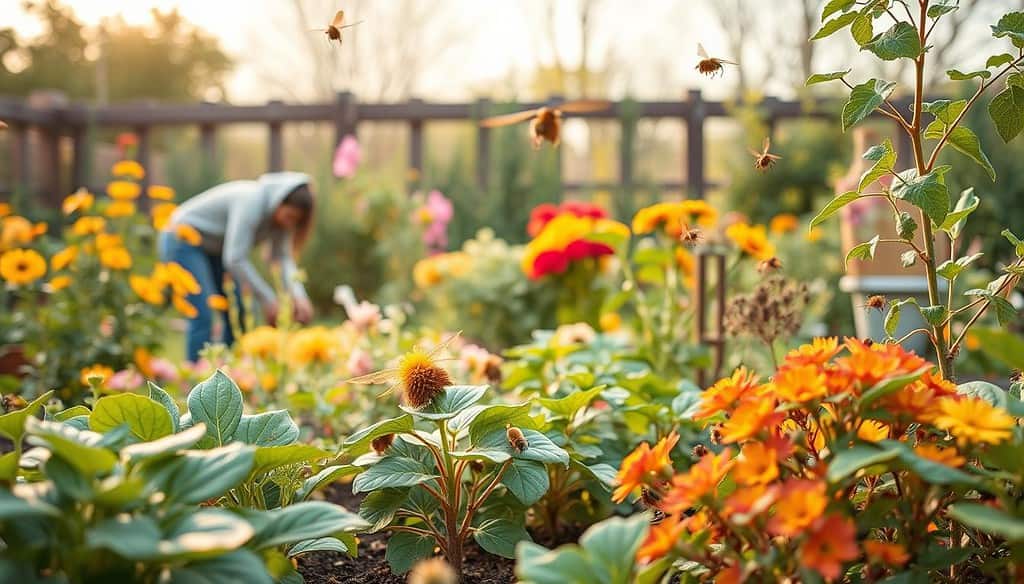
Organic Practices to Enhance Pest Resistance
Use organic methods to make your garden more resilient. Plant alliums to keep aphids, slugs, and Japanese beetles away. Add peppermint to deter ants, spiders, and mosquitoes. Try companion planting, like nasturtiums (Zones 2-11) with other plants, to naturally fight pests.
Regular care like pruning and harvesting helps your garden grow strong. It also makes it better at keeping pests away. By doing these things, you’ll have a garden that’s healthy and free from pests all year.
Conclusion
Natural pest control helps your garden in many ways. Plants like lavender, marigold, and lemongrass make your garden safe for kids and keep pests away. These plants also make your garden look beautiful.
Using sustainable gardening with plant-based pest control is a great idea. Mint, citronella, and lavender keep mosquitoes away, and marigolds protect your plants. You can even grow these plants inside, making it easy for everyone to fight pests in an eco-friendly way.
To make your garden even better at keeping insects away, think about an integrated pest management (IPM) plan. This plan uses different methods, like plants like basil and catnip. Basil keeps mosquitoes, whiteflies, and carrot flies away, and catnip deters aphids, cockroaches, and ants.
Choosing natural pest control helps your garden and the environment. With many plants that repel insects, you can have a garden that’s full of life and pests. These plants support good insects and keep bad ones away. Using plants for pest control is good for the environment and food safety. It supports beneficial insects and avoids harsh chemicals. This approach is eco-friendly and keeps nature in balance. Plants keep pests away by releasing scents and oils. For instance, basil and mint ward off mosquitoes and flies with their aroma. Marigolds have compounds that actively deter pests. Herbs like basil, mint, rosemary, and lavender keep insects away. Flowers such as marigolds, chrysanthemums, and petunias also repel pests. Vegetables like garlic, onions, and tomatoes can deter certain pests too. To keep pests away, plant marigolds with tomatoes or sage with carrots. Place these plants near entry points and vegetable gardens. For containers, use mint, basil, or citronella grass. Basil keeps asparagus beetles and carrot flies away. Nepeta (catmint) is great against aphids. Chives deter Japanese beetles and carrot rust flies. Garlic repels aphids, cabbage moths, and rabbits. Chrysanthemums are effective against many pests like ants, roaches, and bed bugs. Make sure they get enough sunlight and water. Most herbs like full sun and moderate watering. Plant annuals in spring and care for perennials all year. Use organic methods like composting and mulching. Avoid chemical fertilizers to keep plants healthy and pest-resistant.FAQ
Why is using plants for pest control beneficial?
How do plants deter insects naturally?
What are some effective insect-repelling herbs and flowers?
How can I effectively incorporate pest-repelling plants in my garden design?
Which plants target specific pests effectively?
How do I properly care for insect-repelling plants?





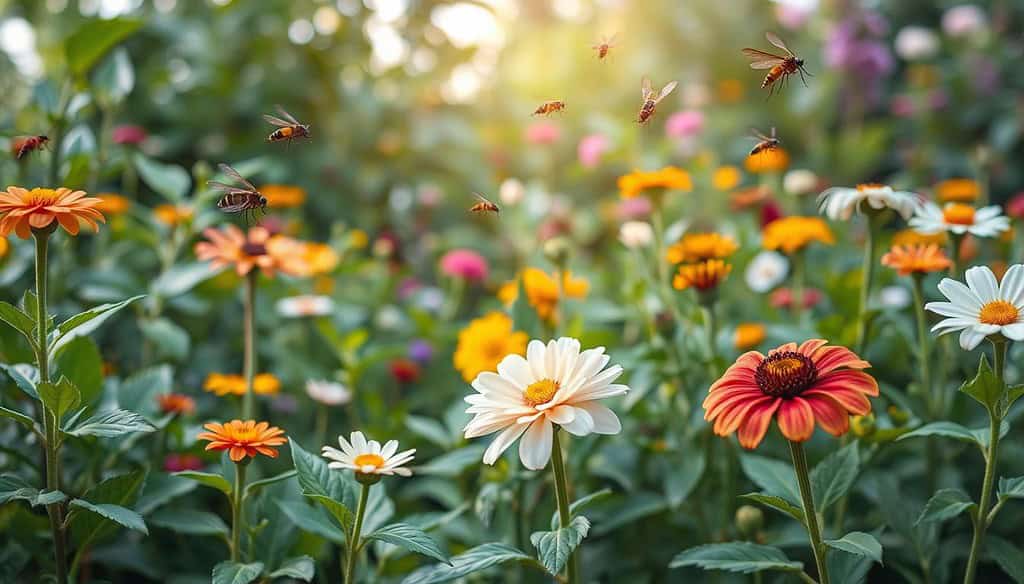



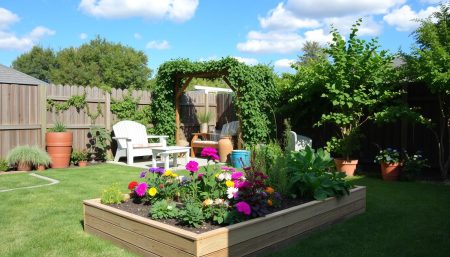
12 Comments
What about slugs? Ugh I need some serious slug-defending plants in my garden pronto!! Garlic doesn’t seem to do much.
Try beer traps! Slugs love beer more than garlic lol 🍺
Very informative! I’ve been using marigolds for years in my garden with great success. They truly are a natural insect repellant. You should also mention neem oil as another organic solution.
@HerbivoreHunter Actually, there’s science behind companion planting! Basil *does* help repel pests, especially around tomatoes. Maybe try it before mocking? 😉
*snorts* so ur telling me catnip keeps bugs away AND drives my cat crazy??? Guess who’s planting an entire FIELD of it now???
Plants that repell bugs?! Or maybe just plants that pretend to repell bugs so they can secretly snack on you while your sip your coffee outside? Hm.. suspicious 🤔
(omg) i have NEVER heard that lavendar can do that!!! Why dont people talk about this more?? im going to fill my hole garden with lavender and basil!! 🐝💜
*Oh yes* plant basil next to your tomatoes because we all know mosquitoes have a refined palate 🙄 Seriously tho… who writes this stuff? Sounds more like a salad recipe.
this is nice but let’s be honest…by the time you’ve planted all these plants for pest control you’d need an entire FARM lol 😂
I never thought thet plants cud keep insects away… but like, wow. I gess nature is smarter than us after all. Gonna plant some lavendar now and see if it realy works 😅
@HerbivoreHunter Lol! Well, at least if the mosquitoes don’t leave, you can make some pesto right?